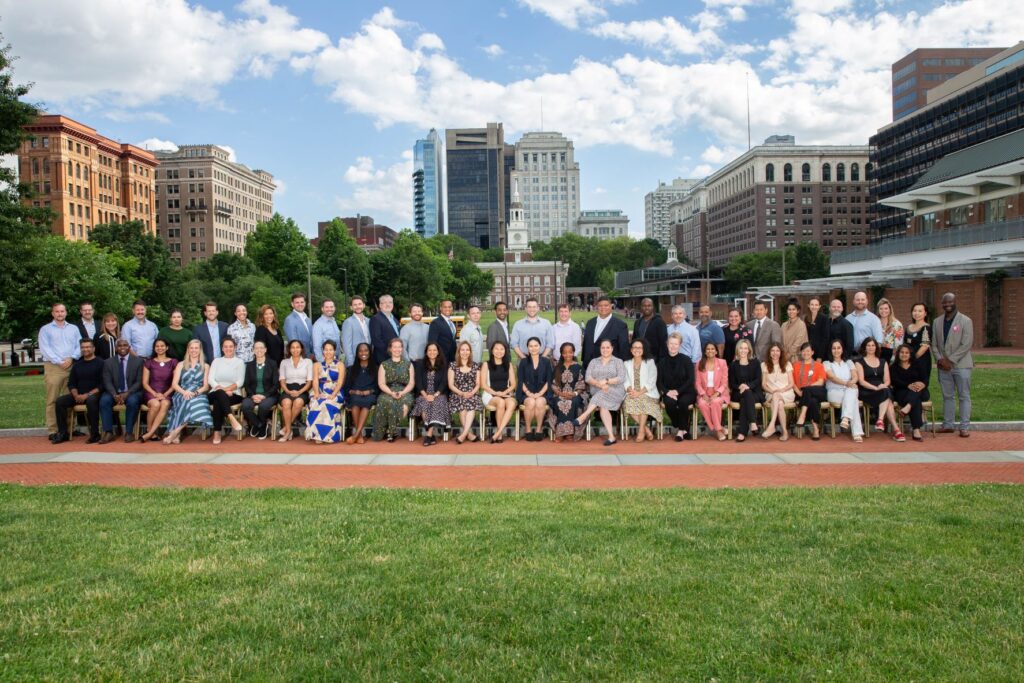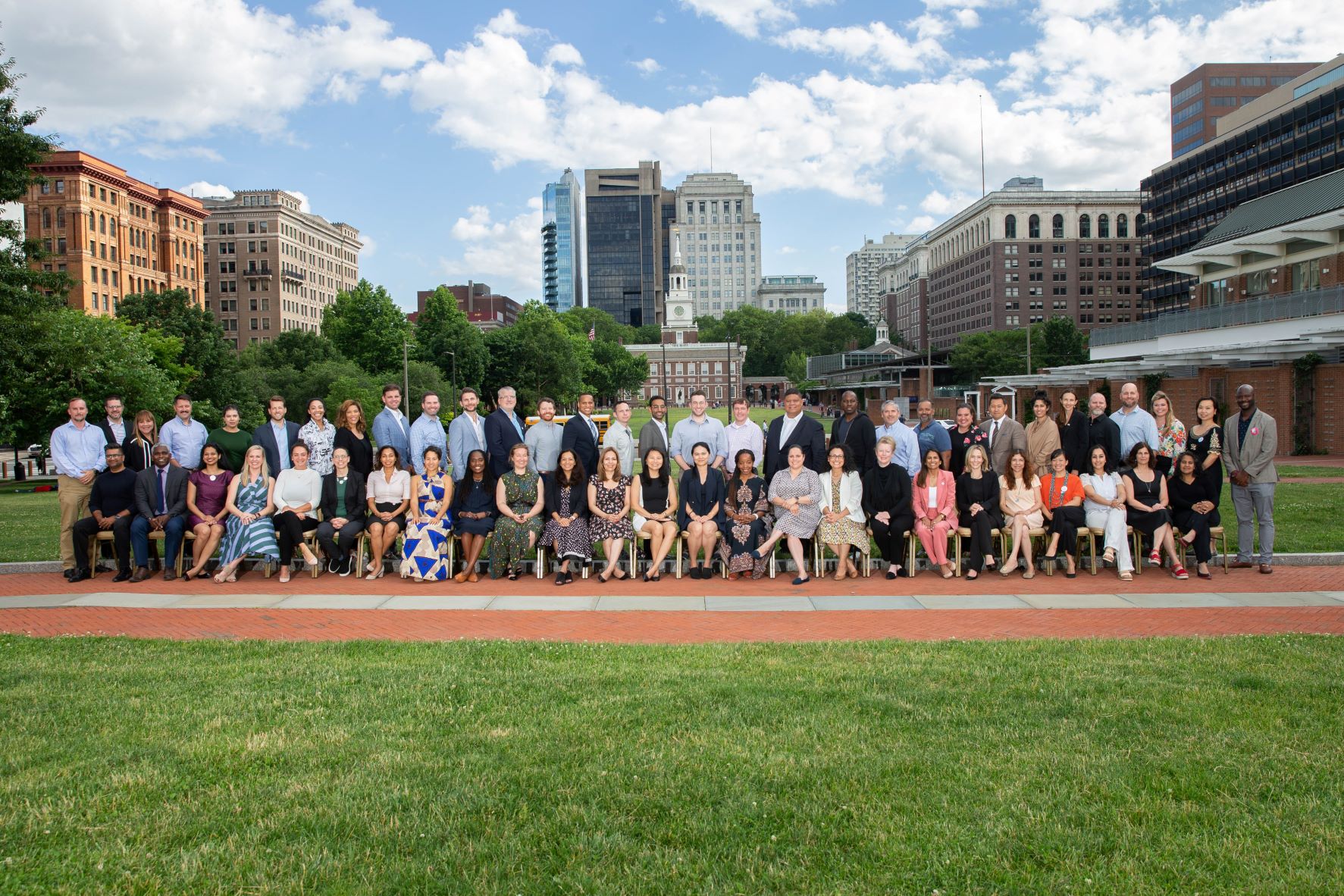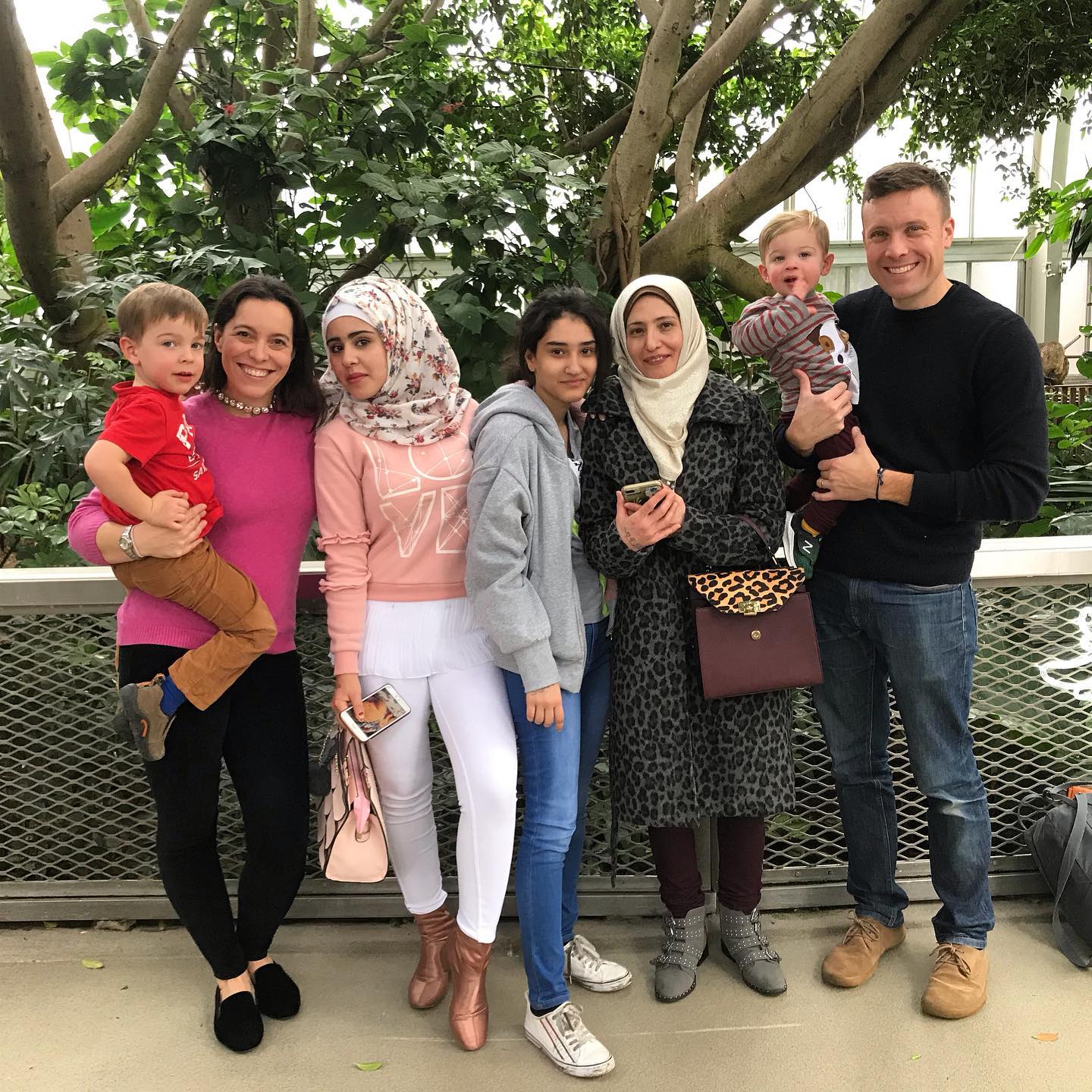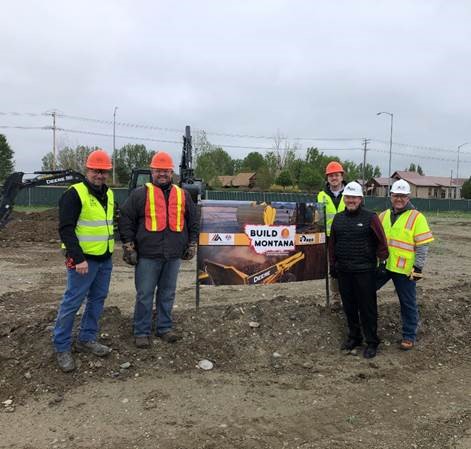Hello Neighbor works to improve the lives of recently resettled refugee and immigrant families by matching them with dedicated neighbors to guide and support them in their new lives. Presidential Leadership Scholar Sloane Davidson, Founder and CEO of the nonprofit, joined us this World Refugee Day to discuss how the organization is personifying what it means to be a good neighbor. She also shares how PLS has impacted the organization and her personal leadership journey.
full transcript below
Can you tell us about Hello Neighbor and its origin?
Hello Neighbor is an organization I founded in Pittsburgh, Pennsylvania, in 2017. Pittsburgh happens to be my hometown, and I was really looking for a way to feel like I was making a big difference in my community. One of the areas that I saw had a big white space of opportunity was in how we think about and treat and welcome our newest neighbors, and those are refugees and immigrants.
Refugees in particular, have been forced to flee their homes and are rebuilding their lives from scratch. The federal government formalized what the refugee resettlement program would look like in the United States in 1980, and that provides 90 days of initial support. And when I learned that, I thought, well, what happens on the 91st day? And what happens after that? And how do you really get to meet your neighbors? How do you become more comfortable and confident in your new surroundings? I saw an opportunity to create a mentorship program where we directly match refugee families with everyday, caring neighbors to help guide and support them in their new lives.
That first mentorship program in 2017 has blossomed into a full-scale nonprofit, and we’ve now matched 150 refugee families from 17 countries of origin. We track a couple thousand volunteer hours per month, and we see incredible things that happen when you just bring people together. In addition, we have programs that support expecting moms and babies. Navigating the healthcare system is incredibly challenging for lots of people, especially if you have language and cultural barriers. It can be an incredibly intimidating experience, so we help a lot of new moms who are going through that.
We also have a program that started during the COVID-19 pandemic for remote tutoring. What’s interesting is that they say learning loss is going to be happening for years to come. So, we’re working on supporting those English language learners and how they navigate the classroom but also how they navigate that school experience when they are the first in their families to go through the U.S. educational system.
In addition to those family service programs, we have a refugee resettlement arm. Just this past year we were awarded our first federal contract. It’s a really big deal for an organization as young as ours, and making that big impact right out of the gate is incredibly exciting.
I like to say we had been starting on day 91, and now we start on day one.
How did you utilize the Presidential Leadership Scholars program to maximize your impact at Hello Neighbor?
The project I focused on as part of the Presidential Leadership Scholars program was building out our national programming. The Hello Neighbor network is a coalition of grassroots and community-based nonprofit leaders who work with immigrants and refugees in their local communities. Our goals in the network are to help provide the training, support, collaboration, and community for those leaders to scale their organizations and to build more welcoming and inclusive communities all around the country. What started as eight organizations in eight states is now 100 organizations in 40 states. And so, that has all happened just in the last couple of years, and I think it really shows how many communities are thinking about this and thinking about what it takes to create a welcoming environment.
Tell us about the challenges you’re seeing in refugee resettlement and support services.
The majority of refugees are women, children, and families. So, just like any other topic in America, when you’re looking at someone who’s marginalized, who has low income, who’s starting from scratch, there are barriers – and sometimes systemic barriers – to achieving that version of the American dream for themselves. And affordable housing is a really big issue in our country.
A lot of people don’t know that refugees are not eligible for low-income housing. They are coming here without income verification, and landlords can’t meet them first. So, as a refugee resettlement agency, we have a responsibility to build relationships with landlords to say, “We have this wonderful family that’s coming in. We’d like to secure their apartment in advance so we can do the housing setups, we can get everything ready for them, and we can bring them here from the airport if possible. But you have to trust us because you can’t meet them first.”
It’s really critical for refugees to have to have safe, affordable, non-predatory housing that’s also on a bus line or has other transportation available nearby because they’re not going to have a license or a car. That really narrows down your options for affordable housing. On top of that, we see across the country that rent prices are skyrocketing. And so, that housing piece is absolutely one of the anchors, and it has been incredibly hard to navigate, especially in the last six to nine months.
Talk about the importance of bringing attention to the larger refugee community.
The news only covers a thin slice of just about every issue, and refugees are no exception. Afghan and Ukrainian refugees account for a very thin slice of the refugees who come to the United States from around the world. More than 80 million people around the world have been forced to flee their homes. That number is skyrocketing because of Ukraine. So, we do pay a lot of attention to the news, but that doesn’t mean that’s the work happening on a day-to-day basis. People are being supported from all over the world, and the United States is just one of many countries that has formalized refugee resettlement programs.
It’s important to think about what it takes to create a neighborhood and a community for these refugees. We know that people with different ideals, political backgrounds, religious backgrounds, experiences, literacy levels, are what builds a thriving community. These are people who are in your schools, enrolling in community college, getting a car for the first time, starting to look towards a home purchasing and starting a business. It takes everybody to create community, and that’s especially true when you’re talking about newcomers who want to feel welcome and accepted.
What is you hope for our newest neighbors?
My hope for our newest neighbors — who really are aspiring Americans – is that they get to a place where they’re able to dream for themselves. I think dreaming is a privilege. I think that only when you’re in the position to have your basic needs met, to be able to work through the trauma that you experienced, are you able to even think about the future. And so, the greatest dream that I have is that they’re able to get to a place where they can start to see a future for themselves and for their children.
How has the Presidential Leadership Scholars program impacted your leadership journey?
It’s really hard to put into words how I feel about the Presidential Leadership Scholars program because it has given me friends that I’ll have for a lifetime. It’s given me mentors I look up to and admire, and there’s a validation that the work I do matters.
I think sometimes there’s this idea that as a leader, you just walk around confident all the time. But many leaders, myself included, still wonder if we fit in a certain room. Have I accomplished what these other people accomplished? To be in a space with so many other incredible leaders makes me feel like I’m being seen and this work matters. And being seen is one of the first ways that you start to feel like you can move forward.
I also feel that you can dream the biggest dream in the world, and when you start to move towards it, you’re like, “Was I dreaming big enough? Can I dream bigger?” In the program, I got to interact with President Bush who said, “Oh yeah, Hello Neighbor in Pittsburgh. You do such incredible work,” and sit at a dinner table with President Clinton talking about complex geopolitical issues. Have I dreamed big enough? Because these are pretty big, impressive tables.
I don’t know where the ceiling is for Hello Neighbor, but I feel confident that with the support of PLS, the institutes that support PLS, and my fellow Scholars, anything is possible.



